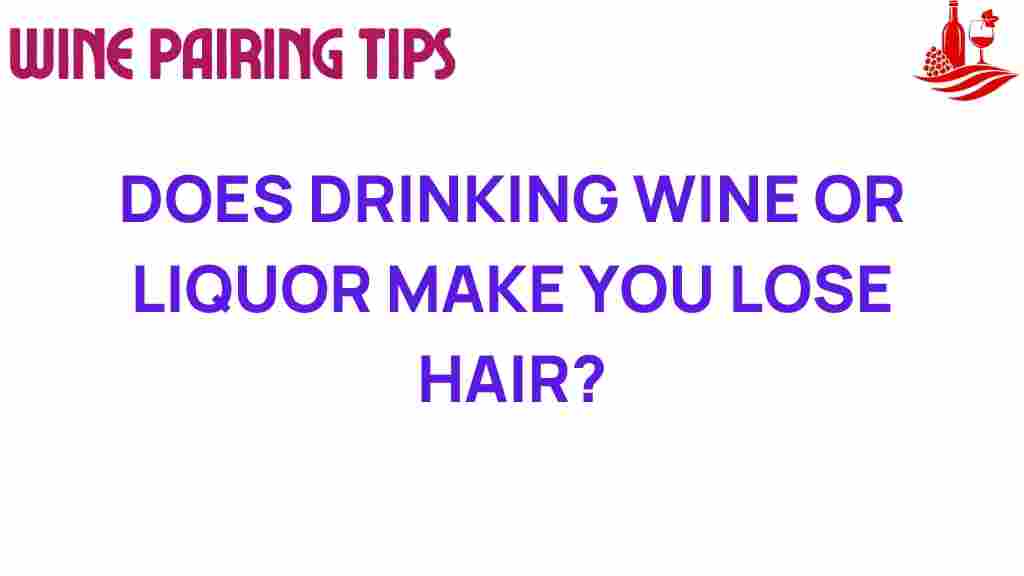Unraveling the Mystery: Does Drinking Wine or Liquor Cause Hair Loss?
When it comes to maintaining healthy hair, many factors play a role, including genetics, diet, and lifestyle choices. One topic that often arises in discussions about hair health is the impact of alcohol consumption, particularly wine and liquor, on hair loss. In this article, we will explore the relationship between hair loss, wine consumption, and liquor effects, examining how these beverages affect our overall health and, more specifically, our scalp health and hair thinning.
The Connection Between Alcohol and Hair Loss
Before delving into the specifics of wine and liquor, it’s essential to understand how alcohol affects the body and why it might contribute to hair thinning. Alcohol is a depressant that can disrupt various bodily functions, leading to several health issues, including:
- Dehydration
- Nutrient deficiencies
- Hormonal imbalances
- Increased stress levels
These factors can significantly impact the health of your hair and scalp. Let’s break down how each of these can lead to hair loss.
1. Dehydration and Its Impact on Hair Health
Alcohol consumption can lead to dehydration, which may cause your scalp to become dry and flaky. A dehydrated scalp can result in:
- Increased dandruff
- Itching and irritation
- Weak hair follicles
When hair follicles are weak, hair can become more prone to falling out, leading to noticeable hair thinning over time.
2. Nutrient Deficiencies
Excessive alcohol consumption can interfere with the absorption of essential nutrients, such as:
- Vitamins A, C, D, and E
- Biotin
- Iron
- Zinc
These nutrients are crucial for maintaining healthy hair growth. A deficiency can lead to slower hair growth and increased shedding, exacerbating the problem of hair loss.
3. Hormonal Imbalances
Alcohol can also disrupt hormone levels in the body, particularly those related to stress and reproduction. Stress hormones like cortisol can cause hair to enter the telogen phase prematurely, resulting in increased shedding. Additionally, hormonal changes can affect the hair growth cycle, leading to further hair thinning.
4. Increased Stress Levels
While many people drink alcohol to relax, excessive consumption can actually increase stress and anxiety levels. Chronic stress is a known contributor to hair loss, making it a double-edged sword when evaluating the effects of alcohol on hair health.
Wine Consumption vs. Liquor Effects
While both wine and liquor can impact scalp health and hair loss, there are some differences worth noting. Let’s explore how each type of beverage may affect hair health differently.
Wine Consumption
Wine, particularly red wine, contains antioxidants such as resveratrol, which can have positive health effects. Moderation is key, as moderate wine consumption has been linked to certain health benefits, including:
- Improved cardiovascular health
- Better blood circulation
- Potential reduction in stress
These factors could, in theory, support healthy hair growth. However, excessive consumption still leads to the negative effects previously discussed, such as dehydrating the body and causing nutrient deficiencies.
Liquor Effects
Liquor, on the other hand, is typically consumed in larger quantities and can have a more pronounced effect on the body. The high alcohol content in liquor can lead to:
- More significant dehydration
- Greater nutrient depletion
- Severe hormonal imbalances
As a result, those who consume liquor excessively may experience more pronounced issues with hair loss than those who drink wine in moderation.
Scalp Health and Lifestyle Choices
Beyond just the type of alcoholic beverage consumed, overall lifestyle choices play a crucial role in determining hair health. Here are some lifestyle factors that can influence hair thinning:
- Diet: A balanced diet rich in vitamins and minerals is vital for hair health.
- Hydration: Drinking plenty of water can help maintain scalp health.
- Stress Management: Engaging in stress-reducing activities can prevent stress-related hair loss.
- Hair Care Routine: Using gentle hair products and avoiding excessive heat styling can promote healthier hair.
Step-by-Step Process for Maintaining Hair Health
To mitigate the risk of hair loss associated with alcohol consumption and other lifestyle factors, consider the following steps:
- Monitor Alcohol Intake: Limit your alcohol consumption to moderate levels. The CDC defines moderate drinking as up to one drink per day for women and two drinks per day for men.
- Stay Hydrated: Drink plenty of water, especially if you consume alcohol. Aim for at least eight glasses a day.
- Eat a Balanced Diet: Incorporate plenty of fruits, vegetables, lean proteins, and whole grains into your diet.
- Manage Stress: Engage in activities such as yoga, meditation, or exercise to help manage stress levels.
- Care for Your Hair: Use gentle shampoos and conditioners, and avoid excessive heat styling.
Troubleshooting Tips for Hair Loss
If you are experiencing hair thinning and suspect it may be related to your alcohol consumption or lifestyle choices, consider the following troubleshooting tips:
- Consult a Healthcare Professional: Speak with a doctor or dermatologist to rule out underlying health issues.
- Review Your Diet: Track your nutrient intake and consider a multivitamin if you suspect deficiencies.
- Consider Your Hair Care Products: Switch to sulfate-free shampoos and nourishing conditioners.
- Limit Stress: Identify stressors in your life and find ways to reduce or manage them.
Conclusion
While the relationship between wine consumption, liquor effects, and hair loss is complex, it is clear that excessive alcohol consumption can negatively impact hair health. Dehydration, nutrient deficiencies, hormonal imbalances, and increased stress all contribute to hair thinning and scalp issues. By making informed lifestyle choices and moderating alcohol intake, you can support your overall health and promote healthier hair. For further reading on maintaining hair health, check out this comprehensive guide on hair care.
Remember, moderation is key, and a balanced approach to alcohol and health will lead to better outcomes for your hair and overall well-being.
This article is in the category Tips and created by Wine Pairing Tips Team
